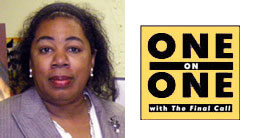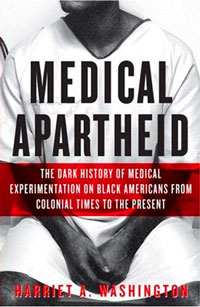FCNNEWSSOURCE

(FinalCall.com) – In many ways, community epidemiologist Yaa Simpson and ethicist Harriet A. Washington think alike. So when Ms. Simpson invited the noted author to address an audience in Chicago at a National Black HIV/AIDS Awareness Day event, Ms. Simpson knew what to expect.
“Her task was to layout why Blacks fear medical research,” said Ms. Simpson, who held the event to launch her organization, The Association for Clinical Trial Services (TACTS). “Blacks are not represented in clinical trials; therefore, we aren’t receiving the best treatment that can be offered. If we can bring truth to what happened in the past, maybe we can bring intervention for the future.”
Ms. Washington’s groundbreaking book, “Medical Apartheid: The Dark History of Medical Experimentation on Black Americans from Colonial Times to the Present,” is the first to chronicle that history of medical experimentation on Black people in America. From brutal experimentation on slaves forced to undergo surgery without anesthesia, to the notorious Tuskegee Syphilis Experiment, to treatments with radiation associated with X-ray technology, Ms. Washington traces centuries of abuses that cause many Blacks to distrust the medical establishment today. Ms. Washington talked to Final Call contributor James Muhammad, a former Final Call editor-in-chief.
FC (James Muhammad): Why the title, “Medical Apartheid?”

HW (Harriet Washington): In America there are two major populations with health profiles that differ so dramatically that it’s as if you were looking at people in two different countries. This is a result of a long history of policies that favored Whites and did not serve the health of Blacks. Due to this engineered, dramatic difference in health profiles, “Medical Apartheid” seemed the perfect analogy because apartheid is the engineered and government sanctioned separation of the races.
FC: Why hasn’t this kind of book been written before?
HW: A lot of the history has been unknown, and that which was known was ignored. If you go into medical libraries you will find many volumes detailing the abuse of Jews and Poles and Eastern Europeans under the Nazis. You’ll find many volumes of disparate treatment of poor and foreign Whites. But when you look at the medical history of African Americans there’s almost nothing. It gives the impression that nothing was done to Black people.
FC: Yet, the situation persists?
HW: The dangers are more subtle today than in the past, and they also threaten White people. A perfect example is what I call “the erosion of informed consent.” An example is the PolyHeme Studies, a commercial product made from old, expired blood. The 1996 amendment to the Code of Federal Regulations said if you have an emergency where a patient is unconscious and needs treatment to save his life it is acceptable to use experimental treatments without getting his permission. Once that became law, companies began exploiting it. For several years in this country you had a situation that if you fainted and had blood loss, the paramedics could give you artificial blood. And once you got to the hospital you would continue to get artificial blood. When the study ended, they found that people who received the artificial product had a dramatically higher chance of suffering a fatal cardiac event. Seventy-five percent of the people in the study were African Americans. So you had a situation very recently where Black people were put into a research study without their permission and the study turned out to be dangerous. Twenty five percent of the people were White and they ran the same risk.
FC: Isn’t the task of the physician to preserve life?
HW: Medical science and American physicians made slavery possible by coming up with theories about Black people that said we were inferior and made by the creator to serve as slaves. They came up with imaginary diseases such as drapetomania, a disease that struck slaves that ran away. So a slave in Greece and Rome might run away and it would seem a perfectly sensible thing to do, but a Black slave in America who ran away or destroyed the master’s property was deemed mentally ill.
FC: Talk about how research was done.
HW: A lot of physicians were slave owners who brought slaves in order to do medical research. Blacks were used to show doctors-in-training what diseases looked like and how to amputate limbs. Every important reproductive advancement in this country was perfected by doing experiments on Black women—the removal of the uterus, Cesarean section, the removal of ovaries. I submit that recent developments like forcing Black women but not White women to undergo Norplant implantation after they’ve been convicted of child abuse is an extension of eugenics behavior.
FC: How do you view the emergence of HIV and AIDS?
HW: Infectious diseases in general are treated differently in marginalized groups. There have been research errors that have contributed to the problem. In 1982, an important study was done to assess how well AZT worked. It showed that it worked very well for Whites; it would slow the progression from HIV to AIDS. But they also said AZT showed no benefit for Blacks, and it had dramatic side effects. The message was that AZT was indispensable for Whites, but Blacks should not take it. All this happened because so few Black people were included in the studies and that small number did not respond to AZT. However, when better studies were done that had a more commensurate number of Black people, it became apparent that AZT worked well in Blacks. But the damage had been done. One would have to go back and do rigorous studies to try to trace what the effect of this was. An advantage of AZT is it dramatically decreases the possibility of passing on HIV during childbirth. So, Black women, who didn’t have the benefit of taking AZT, had children that were more likely to be born HIV-positive than White women taking AZT.
FC: Do you feel HIV might have been a result of biological warfare research?
HW: We have not been presented with evidence for HIV/AIDS being devised as any type of weapon. There’s always a possibility that it could have arisen by accident as a result of research. But there is no evidence of that. However, there has been a lot of bio-terrorism against Back people. In areas of the South, U.S. engineers took mosquitoes infected with pathogens that cause diseases like yellow fever and whooping cough and released them in Black areas in cities and counties. In some areas you could go back a year or two later and see that the rates of whooping cough, for example, went up dramatically. They wanted to see if they could use that kind of pathogen as a weapon, for example, against Korea.
FC: And other areas?
HW: There were many U.S. scientists who worked with South Africa’s apartheid government that actively was devising biological weapons to be used against the Black majority. They wanted not only agents that would poison, but they also were looking for agents that could be put into the water to kill Blacks. They were looking for contraceptives that could be spread over areas that only would affect Black people.
FC: What about the Tuskegee Syphilis Experiment? It’s infamous in medical research.
HW: Unfortunately, the impression is that it was the only untoward thing done to Black people. If you think that, then you look at Black people’s aversion and fear of the system as an overreaction. Then the question becomes, why would Black people be so afraid of medical care and so leery of medical research on the basis of one abusive study? In reality there were hundreds, if not thousands of abusive studies that consistently targeted and exploited Black people that they not only did not agree to, but often were not aware of what they were being subjected to. Black people have a logical, rational fear of the medical establishment borne of centuries of abuse and exploitation. At the same time, we must take control of that fear.
FC: In fact, Tuskegee was a government-controlled study, wasn’t it?
HW: The problem with the name Tuskegee Syphilis Study is it besmirches the name of Tuskegee University, when it was actually the U.S. Public Health Service that did the study, and that’s what I’m careful to call it.
FC: The experiment is famous for a Black nurse named Eunice Rivers.
HW: She was a low-level public health nurse who had no scientific training, yet she was given the title of scientific assistant. When people began questioning whether it was right not to treat these men a paper was published and Eunice Rivers was given the prestigious position of first author, in front of all these public health luminaries who were M.D.s. That was clearly a cynical ploy, an attempt to make this look like a multi-racial study rather than one conducted by White men.
FC: What happened to nurse Rivers?
HW: In the aftermath of the study, all the principals were interviewed, including Rivers, by a government panel. I interviewed the surviving panel members. It was the first time they ever revealed that after they taped interviews with Rivers’ people, they decided to destroy the tapes. They said it was done at the urging of a government functionary on the panel. What’s interesting is many people know Eunice Rivers’ name, but who knows the names of the White men who designed and conducted the study?
FC: What are your recommendations?
HW: We need to educate ourselves and focus on learning everything we can about medical research, specifically how to discern for ourselves what is likely to be good medical research that benefits us as opposed to bad medical research which is likely to stigmatize or harm us.
I propose that the government should take on the expense of offering everybody education about medical research, like a week of classes where they learn about research. The classes should teach what questions to ask, what consent forms should and shouldn’t say, and what the law guarantees you. Nobody should be permitted to enroll in a study unless they’ve had that course.
Secondly, there are institutional review boards whose job it is to evaluate medical research, and if it’s not ethical or legal, they must reject it. These boards have been letting through all kinds of unethical and abusive experiments. The government must conform to the law and start providing oversight to these boards.
Lastly, there are people in the government now who call themselves ethicists, but they are slowly changing our laws so that exceptions increasingly are being put through.
In 1990, the Department of Defense asked for and was granted a waiver by the Food & Drug Administration to do medical research on soldiers without asking permission. For over 10 years soldiers were forced to take experimental anthrax vaccines and pyridostigmine against possible terrorism attacks. These all were experimental and a lot of soldiers died, some went blind, some had miscarriages, and hundreds were court-martialed and/or thrown out of the Army because they refused (to take the vaccine). The law finally was reversed, but not after a lot of people were harmed.
We have a lot of U.S. researchers abroad in Africa and in developing countries doing research they can’t legally do in this country. So people in the Third World are being abused and treated like the laboratory of the West.
FC: Thank you.












